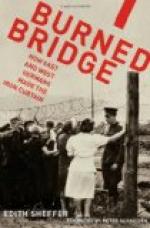The plague of mosquitoes had somewhat abated. In the early morning and for a time in the evening, and also when rain dampened the atmosphere, these pests still kept a man’s hands busy warding them off. But through the dry heat of the day he could go abroad in reasonable comfort.
So now Mr. Thompson washed up his dishes in a fashion to make the lips of a careful housekeeper pucker in disdain, clapped on his broken-rimmed straw hat and sallied forth.
He was full of an earnest desire to do good, as he defined doing good. He had come here for that purpose, backed by an organization for just such good work. This evangelical fire burned strong in him despite the crude shifts he was put to, the loneliness, the perplexities and trials of the spirit. Just as an educated humanitarian coming upon an illiterate people would gladly banish their illiteracy, so Thompson was resolved to banish what he deemed the spiritual darkness of these primitive folk. Holding as he did to the orthodoxy of sin and salvation, of a literal heaven and a nebulous sort of hell, he deemed it his business to show them with certainty the paths that led to each.
But he could not reach them unless he could speak their tongue, he could not gather them about him in the open meadow as the Man of Galilee gathered his disciples about him. The climate was against that simple procedure. Therefore he postulated two things as necessary to make a beginning—to learn the tribal language and to build a church.
He was making an attempt at both, and making little more progress than he made in the culinary art. Only a naturally vigorous stomach enabled him to assimilate the messes he cooked without suffering acute indigestion. Likewise only a naive turn of mind enabled him to ward off mental indigestion in his struggles with the language. Whatever the defects of his training for what he considered his life work, he had considerable power of application. He might get discouraged, but he was not a quitter. He kept trying. This took the form of studying the Athabascan gutturals with the aid of Lachlan’s second son, a boy of eighteen. For an hour in the forenoon and the same in the evening he struggled with pronunciations and meanings like a child learning the alphabet, forgetting, like the child, a good deal of it between lessons. And he had begun work on a log building twenty by thirty feet, that was to be a meeting-house.
He did not get on with this very fast. He laid his foundation in the edge of the timber to lessen the distance his material must be moved. He had to fell trees, to lop off the branches, and cut the trunks to proper length, then roll them with infinite effort to their proper place in the structure. He could only gather how a log building could be erected by asking Lachlan, and by taking the Lone Moose cabins for his model. And he was a fearful and wonderful axeman. His log ends looked as if chewed by a beaver, except that they lacked the beaver’s neatness of finish. His feet suffered manifold hairbreadth escapes from the sharp blade. He could never guess which way a tree would fall. For a week’s work he had got two courses of logs laid in position.




